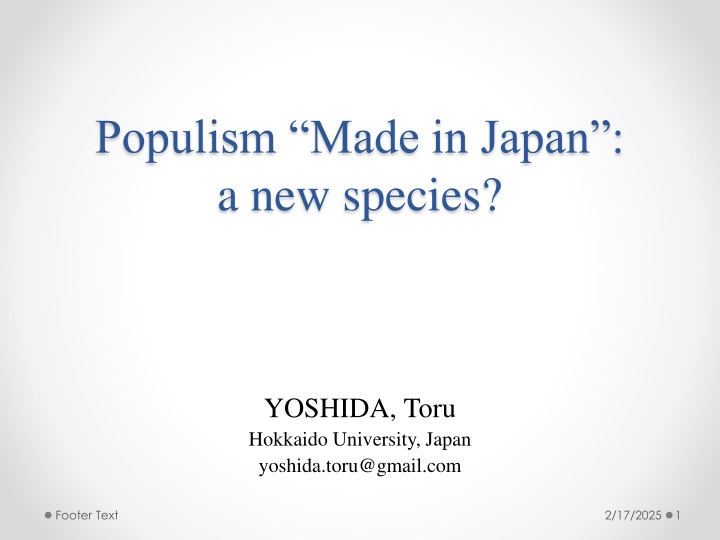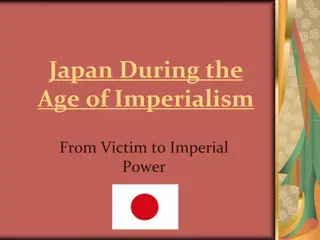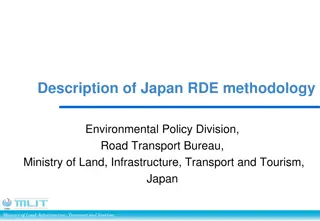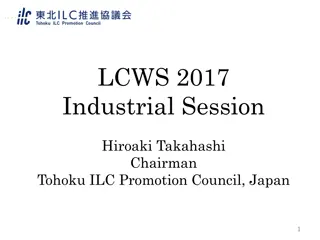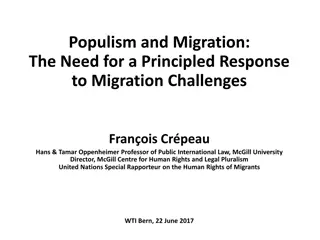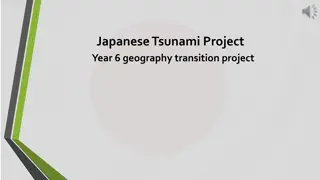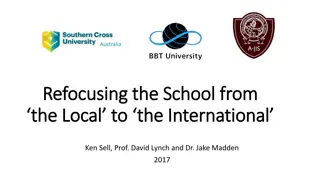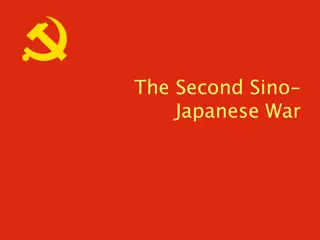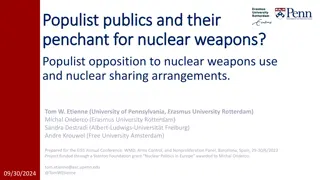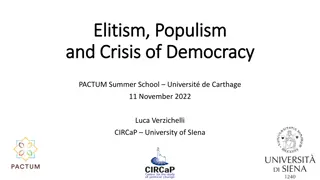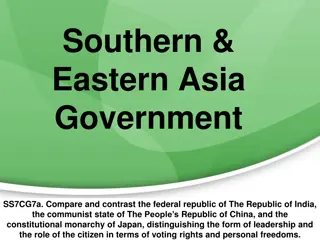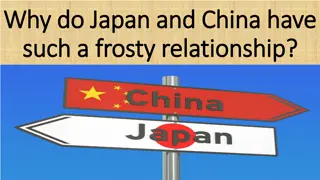Populism in Japan: A Unique Political Phenomenon
In Japan, the presence of populism takes on a distinct form characterized by local politicians adopting a Neo Liberal approach. This Neo Liberal populism emphasizes administrative reforms, pro-market policies, and a critical stance towards intermediate organizations. Unlike traditional populism in other democracies, Japanese populists are mainly local figures with a focus on political reform and pro-business strategies that set them apart in the global political landscape.
Download Presentation

Please find below an Image/Link to download the presentation.
The content on the website is provided AS IS for your information and personal use only. It may not be sold, licensed, or shared on other websites without obtaining consent from the author.If you encounter any issues during the download, it is possible that the publisher has removed the file from their server.
You are allowed to download the files provided on this website for personal or commercial use, subject to the condition that they are used lawfully. All files are the property of their respective owners.
The content on the website is provided AS IS for your information and personal use only. It may not be sold, licensed, or shared on other websites without obtaining consent from the author.
E N D
Presentation Transcript
Populism Made in Japan: a new species? YOSHIDA, Toru Hokkaido University, Japan yoshida.toru@gmail.com Footer Text 2/17/2025 1
Is populism absent in Japan? PM Junichiro Koizumi (2001-2006) as Populist politician (soundbite, theatrical, antagonistic) In established democracies throughout the world, politicians are rising to power by tapping into the people s disenchantment with the elite. Not in Japan. (Funabashi 2017) Anger towards political elites is pervasive. Yet a few rage-free zones remain, of which Japan is the most conspicuous. (Plender 2017) But populists do exist in Local politics. Footer Text 2/17/2025 2
(Local) Populist politician Junichiro KOIZUMI Yasuo TANAKA Toru HAHISMOTO Takashi KAWAMURA Yuriko KOIKE PM 2001-2006 Governor of Nagano (2000-2006) Governor and Mayor of Osaka (2008-2011) Mayor of Nagoya (2009-) Governor of Tokyo (2016-) (Matsutani 2017) Populism defined as : 1) the good people and evil elites, 2) praising the people, 3) theatrical way of communicating Literature on Populism (Gidron & Bonikowsk 2013): 1) thin ideology revering people , 2) distinct style in politics, 3) political strategy as far as these local populists concerns, they are mainly a political strategy for institutional reasons. Footer Text 2/17/2025 3
Neo Liberal populism Characteristic of recent right-wing populism: Culturally authoritarian (politically right) & economically interventionist (politically left) Japanese Populists are Neo Liberal type: praising administrative reforms, pro-market policies and attacking intermediate organizations. .Why Japanese populists are: 1) local/regional figures? 2) politically reform-oriented and pro-business? Footer Text 2/17/2025 4
Neo-institutional interpretation(1) Japanese Local politics is structured under the dual representation system ( nigen daihyo sei ): competencies shared by the executives and assembly Local executive authorities -submit the budget -proposing bylaws -asking reconsideration of the assembly s resolution concerning a budgetary matter -if not resigning, he/she can dissolve the assembly Local assembly authorities -To issue resolutions to establish or amend bylaws -make budgetary decisions -approve statements of accounts -endorse expenditures -submit a motion of no confidence in their executive (majority of at least three-quarters of the vote) Footer Text 2/17/2025 5
Neo-institutional interpretation(2) Executive and councilors are elected by two different electoral system: single seat district single non-transferable vote (SNTV) Rational strategy for local executive (big cities/ prefecture): claiming for administrative reforms, budget cutting, transparency as electorates are independent voters in these regions. Rational strategy for local executive : standing as an agent of vested / occupational interests. established left-right cleavage tends to increase budgets . metropolitan electorates favor neo-liberal agendas. => political strategy for the executive is to perform neo-liberal populism ie. Criticizing established elites and particular interests. Footer Text 2/17/2025 6
Conclusion Populism exists firmly in Japanese local politics. Many of them arises for purely institutional reasons, as actors adapt in attempting to maximize their votes. The dual representation system is the major source of populism; local executives and assembly members elected under two different systems. The former seek to represent general interests, the latter focus on defending sectorial interests. The executives may adopt neoliberal populist strategies appealing notably to the big cities electorates. We could classify Japanese local populism as a variant of political strategy, and not an ideology or organizational structure as certain literature claims. Footer Text 2/17/2025 7
